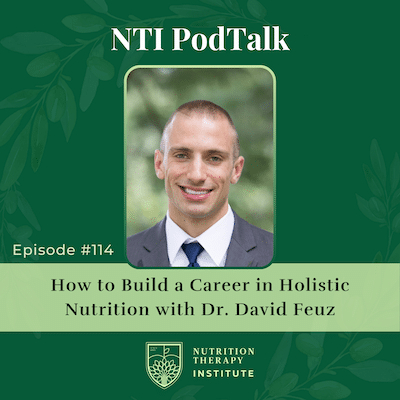
Share this post!
If one thing is for certain in the world of nutrition, it’s that there is more than one way to achieve optimal health through the food, beverages, and supplements we consume. At NTI, we often discuss the concept of bio-individuality, the idea that each of us has unique metabolisms, genetic predispositions, energy needs, and preferences, and as such, nutrition is not one-size-fits-all. That being said, it becomes important to look at the science behind any dietary trend to assess whether it can be beneficial or harmful for a particular person. One trend that’s been getting more attention of late is intermittent fasting.
Generally speaking, intermittent fasting is the concept of consuming meals during a shortened time frame instead of all throughout the day. This usually entails skipping breakfast and finishing evening meals by 7 pm, although there are several different protocols to consider. For generations, many religious groups and cultures have practiced forms of fasting for the cleansing of the body and mind, so this idea is not new.
The goal is to take advantage of the way our bodies were programmed by our ancient ancestors, who did not always have round-the-clock access to food as we do now. Before we had modern agriculture, grocery stores, refrigerators, and food preservation methods, it was not unlikely for humans to go through periods of scarcity, missing meals or even whole days of eating. This scarcity evolved the human body into a survival machine that is adapted to handle alternating periods of abundance and shortage, and unique biochemical processes occur as a result. Some of these processes may actually help with fighting inflammation, maintaining a healthy weight, protection against chronic diseases, and improving cognitive function.
So, just because we can go without eating for intermittent periods of time, does that mean we should? This is where it’s interesting to look at how taking advantage of our bodies’ ability to survive in the absence of food may actually produce great health benefits. Here’s a sample of what the scientific literature says about how intermittent fasting can be used therapeutically.
Weight loss and reduced cravings
This is probably the number one reason why folks first become interested in intermittent fasting, and rightfully so. There is a tremendous amount of research that demonstrates how intermittent fasting can switch the body from burning primarily carbohydrates for energy to burning fat. It is also more effective than traditional calorie restriction in achieving weight loss without losing muscle mass. Furthermore, intermittent fasting has also shown promise in preventing type 2 diabetes, which is associated with weight gain. Intermittent fasting also has a psychological component of teaching you how to be mindful of and control your hunger cues, which will naturally help you avoid overeating.
Greater longevity
Can skipping meals actually make you live longer? More than 20 years ago, scientists discovered that mice placed on calorie-restricted diets lived longer than their well-fed counterparts. Until recently, it wasn’t understood what the mechanism behind this phenomenon could be. A recent Harvard study published in Cell Metabolism revealed that it comes down to how mitochondrial networks relate to longevity. Mitochondria, the sites of energy production within cells, exist in networks that can change shape as cells age. As we age, our mitochondria have a declining ability to produce energy, which leads to age-related disease. The researchers in this study found that by restricting the diet of nematode worms, mitochondrial networks stayed in a “youthful” state and these youthful networks increase lifespan by modulating fat metabolism.
Improved memory and learning capabilities
Fasting enhances a process called autophagy (literally “eating of self”), which is how the body rids itself of damaged proteins and organelles as well as pathogens. Autophagy plays a key role in staving off neurological diseases like Parkinson’s and Alzheimer’s. In mouse studies, eating only every other day resulted in the mice actually growing new neurons and synaptic connections. They were also more alert and demonstrated greater activity in the areas of their brains responsible for learning and memory. This phenomenon hasn’t yet been proven in humans (although trials are likely not far away), but anecdotally, many fans of intermittent fasting have reported greater mental clarity and alertness.
Lower risk of developing cardiovascular disease
Studies have shown that intermittent fasting can lower your risk of coronary artery disease by improving cholesterol levels, triglycerides, and blood sugar levels. It can also reduce blood pressure and increase insulin sensitivity, thus improving cardiovascular health.
A stronger immune system
One study demonstrated that intermittent fasting can actually regenerate your immune system, which may have positive implications for those with immune system deficiencies or autoimmune diseases. It may also help mitigate the damaging effects of chemotherapy for cancer patients.
If you choose to give intermittent fasting a try, keep in mind that while this lifestyle focuses on when to eat and not what to eat, it’s still important to focus on everything else we already know about holistic nutrition, such as recognizing the importance of good sources of fats, plenty of nutrient-dense vegetables, high-quality protein, and complex carbohydrates. There is more than one way to approach this lifestyle, so if it’s something you’d like to try for the new year, here’s an article that outlines different implementation approaches.
Who Should Not Intermittent Fast?
Also, note that this diet is probably not a good choice if you are pregnant or breastfeeding or have a history of or tendency towards eating disorders. For weight loss purposes, it has been suggested that intermittent fasting is more effective in men than women, and anyone with any type of hormone or blood sugar dysregulation should also consider refraining from fasting or choosing a protocol with fewer fasting days. As with any dietary change, you will benefit from working with a medical professional and/or nutrition therapy practitioner to ensure safety and effectiveness.
Cadie Berrian, BA, MNT
Related reading…
The Bedtime Snack: Yea or Nay?
Image: istock.com/Foxys_forest_manufacture
Share this post!


















